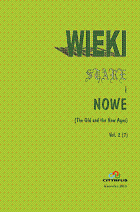Together or apart? Nations living in the Vilinius region towards a perspective of self-determination after the First World War (...)
Together or apart? Nations living in the Vilinius region towards a perspective of self-determination after the First World War (...)
Author(s): Joanna Januszewska-JurkiewiczSubject(s): History
Published by: Wydawnictwo Uniwersytetu Śląskiego
Keywords: Polish-Lithuanian-Belorussian relations after World War I; concepts of the Lithuanian state; multiethnicity of Lithuania; the Vilnius region; political ambitions of ethinc groups in the Vilnius area
Summary/Abstract: The occupation politics of German authorities during the First World War let to a revival of national movements in the territory of the former Grand Duchy of Lithuania. In the final period of the war, the aspirations of the elites, representing particular ethinc groups aiming at building their own state organisms, became the source of conflict. The object of rivalry was Vilnius and the whole Vilnius area The Lithuanians aimed at building the nation based on the domination of Lithuanian culture and language with the capital in Vilnius. They were against the federation with Poland. They received support from a faction of the group of Jewish politicians for the price of the promise to introduce the national-cultural autonomy, although the Jews fom Vilnius were in favor of the conception of the ethnic, not national, state. The Polish community was divided. The minority constituted the advocates of the reference to tradition of a multinational Lithuanian state in which different languages would be official. To them, the restoration of the relationship of Poland and Lithuania would warrant the protection of the rights of the Polish culture and, at the same time, would offer a protection from the potential dangers on the part of Russia. In the Polish camp, the idea of incorporating the whole Vilnius area into Poland dominated. The Belorussian elites were in the most difficult situation, wanting to build a nation whose territory would cover a part of the Vilnius area and Minsk. The yet unshaped national awareness of the Belorussian masses and the lack of a broader class of intelligentsia, forced the Belorussian activists to search for external support in Russia, Poland and Lithuania. However, each of the neighboring countries had territorial interests which would collide with Belorussian aspirations. The advocates of Piłsudski, editing Nasz Kraj in 1919 in Vilnius, regarded a multinational Lithuania federated with Poland as the only chance to unite contradictory programmes. They, however, failed to reconcile the interests of the Lithuanians, Belorussians or even the majority of the Polish community in Vilnius sufficiently to gain support for their conception.
Journal: Wieki Stare i Nowe
- Issue Year: 7/2010
- Issue No: 2
- Page Range: 39-55
- Page Count: 17
- Language: English

